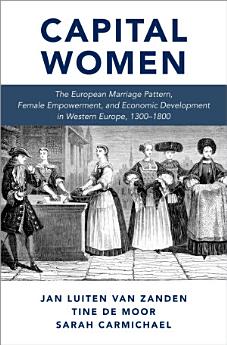Capital Women: The European Marriage Pattern, Female Empowerment and Economic Development in Western Europe 1300-1800
Feb 2019 · Oxford University Press
Ebook
304
Pages
family_home
Eligible
info
reportRatings and reviews aren’t verified Learn More
About this ebook
How women increasingly became economic agents in early modern Europe is the focus of this stimulating book, which highlights how female agency was crucial for understanding the development of the Western European economy and sheds light on economic development today. Jan Luiten van Zanden, Tine De Moor and Sarah Carmichael argue that over centuries a "European Marriage Pattern" developed, characterized by high numbers of singles among men and women, high marriage ages among men and women, and neolocality, where the couple forms a new nuclear household and did not co-reside with the parents of either bride or groom. This was due to the influence of the Catholic Church's teachings of marriage based on consensus, the rise of labor markets, and institutions concerning property transfers between generations that enhanced wage labor by women. Over time an unprecedented demographic regime was created and embedded in a highly commercial environment in which households interacted frequently with labor, capital and commodity markets. This was one of the main causes of the gradual move away from a Malthusian state towards an economy able to generate long-term economic growth. The authors explore how the pattern was influenced by and influenced female human capital formation, access to the capital market, and participation in the labor market. They use numerous measures of economic activity, including the unique "Girlpower-Index" that measures the average age at first marriage of women minus the spousal age gap, with higher absolute age at marriage and lower spousal age gap both indicating greater female agency and autonomy. The book also examines how this measure can increase understanding of contemporary dynamics of women and the economy. The authors thus shed light on the degree to which women are allowed to play an influential role in and on the economy and society, which varies greatly from one society to another.
Rate this ebook
Tell us what you think.
Reading information
Smartphones and tablets
Install the Google Play Books app for Android and iPad/iPhone. It syncs automatically with your account and allows you to read online or offline wherever you are.
Laptops and computers
You can listen to audiobooks purchased on Google Play using your computer's web browser.
eReaders and other devices
To read on e-ink devices like Kobo eReaders, you'll need to download a file and transfer it to your device. Follow the detailed Help Center instructions to transfer the files to supported eReaders.






